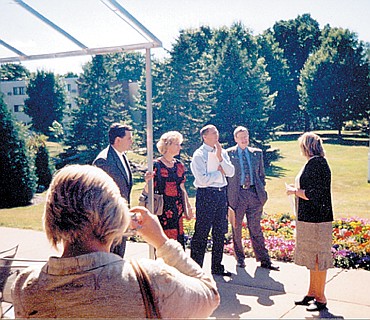September 12, 2003 at 9:10 a.m.
Nursing home issues being researched
Legislative leaders visit on fact finding tour
The group toured the Board of Social Ministry campus in Chisago City and spent time with staff at Parmly Residence, to learn about an industry heavily regulated by the state --nursing homes.
Reps. Sviggum and Boudreau were on their tenth stop in a fact-finding series. They repeatedly told Parmly Campus Administrator Mary Cordts that Parmly Residence was the most well-kept and attractive facility they’d seen.
Cordts stressed the accomplishments are the result of “partnership” developed over the years with volunteers, cooperation of the city and the help of extended family members and local organizations who contribute to Parmly. She often emphasized that the nursing and long term care industry must partner with others, particularly the State Health Department and regulators, to accomplish the tasks needing to be done.
In a listening session in the Parmly chapel, many nursing home staffers told the lawmakers about changes they think are needed in the industry.
What came up:
~ The Chisago County classification for nursing home rate reimbursement is a problem.. Several years ago the late Sen. Janet Johnson got special dispensation for Chisago County nursing home workers to get an “urban” pay rate...but then, about two years ago, the legislature-- trying to make more equity in the system, upped the “rural” pay scale...leaving Chisago County again in the middle of competing for metro employees and staff who might move even further out, for about the same pay.
~ Cordts asked if there was a way the state could help local providers take “crisis” out of care.
She explained her hopes there can be more effort made toward educational outreach and programs to let the public know what’s available.
Cordts said if people took advantage of respite care, adult daycare, home safety programs, and therapy opportunities (all offered through Parmly) they could delay entry into nursing home facilities, while keeping people in better shape mentally and physically.
~ Interpretation of regulations by the “survey teams” working as inspectors is too subjective, lawmakers were told.
The discrepancies in how the inspection teams assess situations and rule on deficiencies need to be addressed, staff members said.
Cordts said the deficiencies cited have no consistency to them, and cause harm to institutions. They see their ability to get insurance affected and actually lose business when websites report cited incidents with no explanations.
Cordts said there needs to be an industry wide acceptance of a definition for “risk.” Outcomes need to be considered, certainly, but what are “potential outcomes” as a survey criteria, staffers wondered.
~ Paperwork and forms are out of control.
Dr. Dummer explained to the lawmakers he’s been seeing patients at Parmly for 17 years and now there is “clearly too much paperwork.” Nurses aren’t getting time to care for residents because they are swamped with documenting everything.
Business office employees also said they can’t even explain all the room rates to people because it’s such a complex system. There are 36 rates for nursing homes in the state system and 44 rates under Medicare.
Cordts ended the visit with a few words of caution for the lawmakers.
She said she fears assisted living and specialized care sites like the dementia unit Margaret’s House, will go the way of the nursing home industry and become so overly regulated the costs will get out of control for those relatively affordable programs.
And, Cordts said the state should be careful about how many nursing home beds are lost. She said downsizing of bedspace could come back to haunt the policymakers in the not too distant future.





Comments:
Commenting has been disabled for this item.